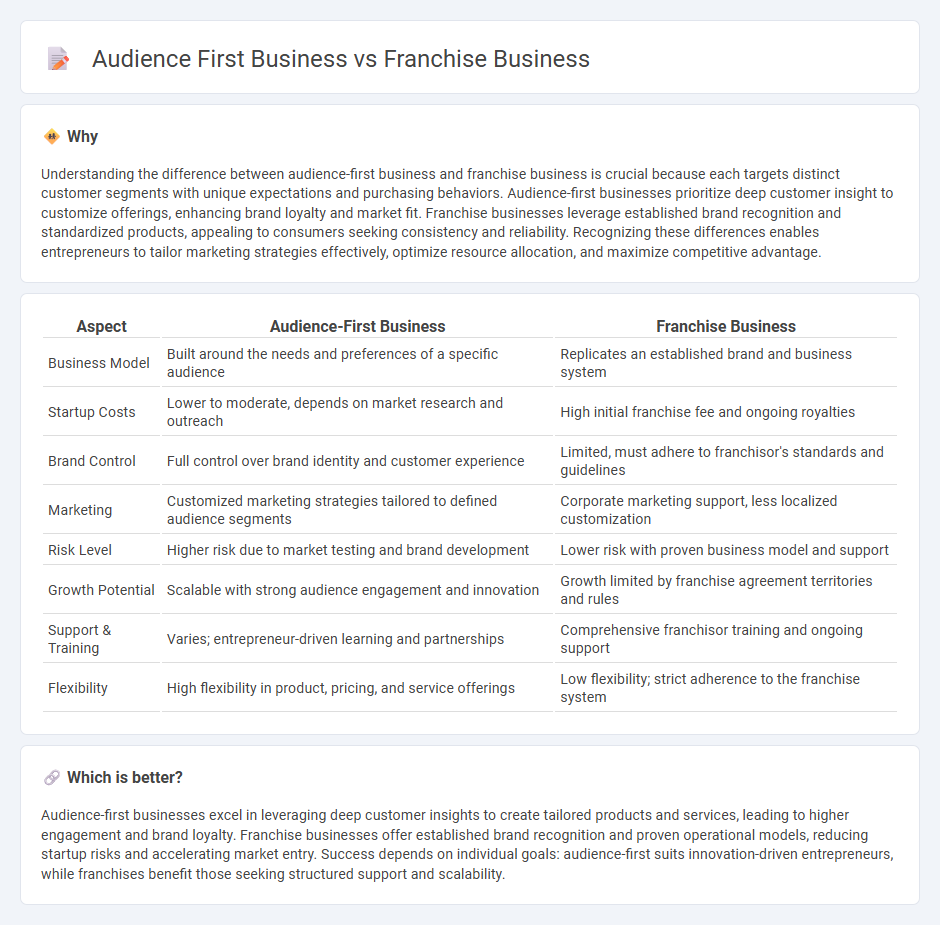
Starting a first business involves creating a unique brand, developing products or services from scratch, and managing all aspects independently, which offers complete control and higher risk. Franchise businesses provide a proven business model, established brand recognition, and ongoing support from the franchisor, reducing startup risks but limiting operational freedom. Explore more to understand which business path aligns with your goals and resources.
Why it is important
Understanding the difference between audience-first business and franchise business is crucial because each targets distinct customer segments with unique expectations and purchasing behaviors. Audience-first businesses prioritize deep customer insight to customize offerings, enhancing brand loyalty and market fit. Franchise businesses leverage established brand recognition and standardized products, appealing to consumers seeking consistency and reliability. Recognizing these differences enables entrepreneurs to tailor marketing strategies effectively, optimize resource allocation, and maximize competitive advantage.
Comparison Table
| Aspect | Audience-First Business | Franchise Business |
|---|---|---|
| Business Model | Built around the needs and preferences of a specific audience | Replicates an established brand and business system |
| Startup Costs | Lower to moderate, depends on market research and outreach | High initial franchise fee and ongoing royalties |
| Brand Control | Full control over brand identity and customer experience | Limited, must adhere to franchisor's standards and guidelines |
| Marketing | Customized marketing strategies tailored to defined audience segments | Corporate marketing support, less localized customization |
| Risk Level | Higher risk due to market testing and brand development | Lower risk with proven business model and support |
| Growth Potential | Scalable with strong audience engagement and innovation | Growth limited by franchise agreement territories and rules |
| Support & Training | Varies; entrepreneur-driven learning and partnerships | Comprehensive franchisor training and ongoing support |
| Flexibility | High flexibility in product, pricing, and service offerings | Low flexibility; strict adherence to the franchise system |
Which is better?
Audience-first businesses excel in leveraging deep customer insights to create tailored products and services, leading to higher engagement and brand loyalty. Franchise businesses offer established brand recognition and proven operational models, reducing startup risks and accelerating market entry. Success depends on individual goals: audience-first suits innovation-driven entrepreneurs, while franchises benefit those seeking structured support and scalability.
Connection
Audience-first businesses prioritize understanding and addressing customer needs, creating tailored products and services that drive engagement and loyalty. Franchise businesses leverage this approach by replicating proven audience-focused models across locations, ensuring consistent customer experiences and brand trust. Both rely on deep market research and customer insights to optimize growth and profitability.
Key Terms
Franchise Business:
Franchise businesses leverage proven operational models and established brand recognition to rapidly expand market presence and reduce startup risks. These businesses benefit from a structured support system, including training, marketing, and supply chain management, which enhances consistency and scalability across locations. Explore how franchise models can optimize your growth strategy and operational efficiency.
Licensing
Franchise businesses prioritize licensing established brand frameworks, operational systems, and proven business models to enable rapid market expansion and consistent customer experience. Audience-first businesses emphasize direct engagement and trust-building with a specific target market, tailoring products and services to meet audience needs before scaling through licensing. Explore how each approach leverages licensing strategies for growth and brand control to decide the best fit for your entrepreneurial goals.
Brand Consistency
Franchise business models prioritize brand consistency through standardized operations, marketing strategies, and customer experiences to maintain a uniform identity across multiple locations. Audience-first businesses emphasize personalized engagement and tailored content that resonates deeply with target demographics, often adapting brand elements to meet audience preferences. Discover how balancing brand consistency and audience focus can optimize your business growth strategies.
Source and External Links
A Consumer's Guide to Buying a Franchise - A franchise business allows an investor to operate under a franchisor's established brand and system, paying initial fees, ongoing royalties, and sometimes advertising fees, in return for training, support, and the right to use the franchisor's name and business model for a set period.
Franchising - Wikipedia - Franchising is a business expansion strategy where a franchisor licenses its trademark, know-how, and business model to a franchisee, who pays fees and agrees to contractual obligations, allowing rapid brand growth with minimized franchisor risk.
What is a Franchise - International Franchise Association - Franchising is a licensing method that expands a business by allowing franchisees to use the franchisor's brand, products, training, and support, in exchange for fees, with the most common type being business format franchising which includes comprehensive operational assistance.
 dowidth.com
dowidth.com